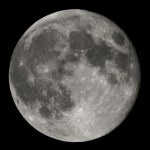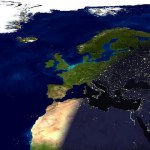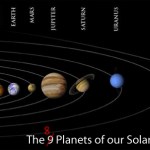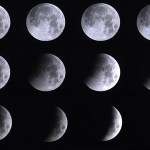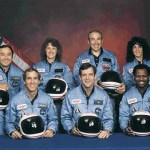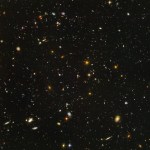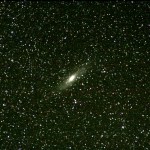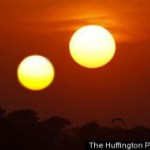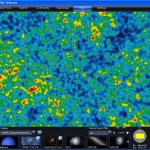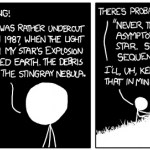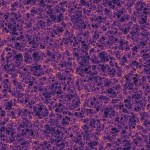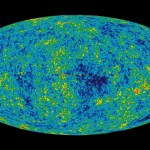Astronomy
"Everything has a natural explanation. The moon is not a god, but a great rock." -Anaxagoras
The Moon, as you well know, is one of the spectacular sights of the night sky, especially when it's full.
Image credit: Luc Viatour.
Even those of us with imperfect vision can see differences between the large, dark areas (known as maria) of dried-up lava beds and the bright, white mountainous regions. But through even the smallest of telescopes or binoculars, brilliant features -- invisible to the naked eye -- emerge.
Image credit: Naoyuki Kurita.
One of the largest craters on the Moon,…
January 28th marked the 25th anniversary of the Space Shuttle Challenger disaster, when one of the rocket boosters separated from the external fuel tank after liftoff and aerodynamic forces tore the shuttle apart. Like millions of Americans, Ethan Siegel and Greg Laden watched the orbiter disintegrate live on TV. Ethan writes that while "we found and fixed the flaws that caused the accident, and returned to space 32 months later with the Space Shuttle Discovery," we "lost our eagerness for human space exploration in a way that would have been unfathomable 20 years prior." NASA shifted its…
"I'll do my dreaming with my eyes wide open, and I'll do my looking back with my eyes closed." -Tony Arata
Would you believe me if I told you that -- in terms of your own eyes -- you saw better at night than you did during the day?
It's true! But it doesn't have much to do with the amount of light available. When you're looking out at distant objects, you'd love to be able to resolve them with your eyes.
For example, that object in the distance, down the road in the image above? Is it a motorcycle with one headlight, a car or truck with two, or (I hope not!) a train with three?
Well, with…
"I don't know whether these people are going to find themselves, but as they live their lives they have no choice but to face up to the image others have of them. They're forced to look at themselves in a mirror, and they often manage to glimpse something of themselves." -Antonio Tabucchi
It's one thing to look up at our galaxy in the night sky, and see the billions of stars clustered together across the great expanse of space.
Image credit: NASA and Serge Brunier.
But what, exactly, do we look like? It is, perhaps surprisingly, one of the more difficult questions to answer. For example,…
"I have announced this star as a comet, but since it is not accompanied by any nebulosity and, further, since its movement is so slow and rather uniform, it has occurred to me several times that it might be something better than a comet. But I have been careful not to advance this supposition to the public." -Giuseppe Piazzi
When we think of the planets, most of you think of either eight or nine, depending on whether you count Pluto or not.
But you all know Pluto's story. Eighty-one years ago, a lone astronomer looking at the same few patches of sky, night-after-night, would look for any…
"It seems like once people grow up, they have no idea what's cool." -Bill Watterson
Well, at least we can all agree on what's not cool. The Sun.
Image credit: NASA, from what looks like the Stereo spacecraft.
With a surface temperature of around 6,000 Kelvins, the Sun is one of the hottest objects that we're all familiar with.
But when it comes to stars, the Sun is merely a "G-type" star. It turns out that there are many types of stars that are -- typically -- more massive, bluer, and hotter than our Sun.
In fact, O-stars, the hottest type, can have surface temperatures over 40,000 Kelvin…
By Dr. Ignacio Mosqueira, an astrophysicist at the Carl Sagan Center for the Study of Life in the Universe, SETI Institute, and Gail Jacobs
Ignacio Mosqueira works with Paul Estrada to piece together the way in which giant planets - such as Jupiter and Saturn -- and their moons and rings formed. Ignacio notes that making moons is similar to forming planets. Understanding moons may have something to tell us about the possible habitats for life, since large moons could, in principle, have both the liquid water and atmosphere necessary for the kind of diverse biology we see on planet Earth.…
Tonight, I saw this Twitter message from Carl Zimmer, a science writer journalist and reporter for whom I have great respect:
MT @BadAstronomer: Media FAIL *again*. This time, it's HuffPo and Apophis.. http://is.gd/OwyJxk CZ: That's $315 million of AOL FAIL now!
While I remain a dedicated HuffPost blogger, I'm the first to recognize that giant news media organizations can be prone to error sometimes in their zeal to garner a wider audience. After all, provocation is a proven method to get someone's attention.
My Scibling, "Orac" over at Respectful Insolence might appreciate this one.
But…
"With hue like that when some great painter dips
His pencil in the gloom of earthquake and eclipse." -Percy Bysshe Shelley
There may be no greater sight for the naked-eye astronomer than a total lunar eclipse. Normally, we get one or two of these a year, and the same wonderful thing happens at each one.
Image credit: Amateur Astronomical Society of Rhode Island.
If you were standing on the Moon, you'd start to see the Earth begin to cover part of the Sun. As the Earth blocks more and more of the Sun, there would be less sunlight landing on the Moon, and one side of it appears to darken…
"We will never forget them, nor the last time we saw them, this morning, as they prepared for their journey and waved goodbye and 'slipped the surly bonds of Earth' to 'touch the face of God.'"
-John Gillespie Magee, Jr.; spoken by Ronald Reagan after the Challenger tragedy
Twenty-five years ago today, I remember being a student in my second grade classroom. It was a big day, because they were launching the first schoolteacher into space, Christa McAuliffe, along with a crew of NASA astronauts.
Televisions were wheeled into our classrooms so we could watch the launch live on television.…
"It's the great mystery of human life that old grief passes gradually into quiet, tender joy. The mild serenity of age takes the place of the riotous blood of youth. I bless the rising sun each day, and, as before, my heart sings to meet it, but now I love even more its setting, its long slanting rays and the soft, tender, gentle memories that come with them..." -Fyodor Dostoevsky, The Brothers Karamazov
Just last week, I wrote to you about one of the deepest images of the distant Universe, the Hubble Ultra Deep Field.
Image credit: Hubble Ultra Deep Field.
And in particular, how we're able…
"The distance is nothing; it is only the first step that is difficult." -Madame Marie du Deffand
If you've got some solidly dark skies, you might notice -- in addition to the great field of thousands of stars -- a few faint, fuzzy objects.
Visible with the naked eye (and captured with only a digital camera), this is the Andromeda Galaxy, as seen from Earth.
At a "mere" 2.4 million light years from us, it is the closest large galaxy to us, by far. As far as our best telescopes can show us, Andromeda looks like this.
Image credit: Mosaic by astropix.nl.
And you don't want to use something…
Please...someone tell me that this is a joke, a hoax, pseudoscience...
I invite perspectives from astronomers, physicists, etc.
According to The Huffington Post:
According to Prof. Brad Carter, Senior Lecturer of Physics at the University of Southern Queensland:
for at least a few weeks, we'd see a second sun, Carter says. There may also be no night during that timeframe.
The report explains:
But doomsday sayers should be careful about speculation on this one. If the star does go super-nova, Earth will be showered with harmless particles, according to Carter. "They will flood through the…
"What do we mean by setting a man free? You cannot free a man who dwells in a desert and is an unfeeling brute. There is no liberty except the liberty of some one making his way towards something. Such a man can be set free if you will teach him the meaning of thirst, and how to trace a path to a well. Only then will he embark upon a course of action that will not be without significance. You could not liberate a stone if there were no law of gravity -- for where will the stone go, once it is quarried?" -Antoine de Saint-Exupery
Gravity, on the largest scales, rules everything in the Universe…
"There, peeping among the cloud-wrack above a dark tor high up in the mountains, Sam saw a white star twinkle for a while. The beauty of it smote his heart, as he looked up out of the forsaken land, and hope returned to him. For like a shaft, clear and cold, the thought pierced him that in the end the Shadow was only a small and passing thing: there was light and high beauty for ever beyond its reach." -J.R.R. Tolkien
But over at XKCD, that quote provides little comfort. After all, "for ever" isn't exactly quite right.
Even the stars must all exhaust their fuel and die.
Right?
Let's head on…
"This is the first time in my work that I've really gone out on a limb and made a very specific prediction - I didn't give myself any elbow room... If we're right, then it's a huge success and you can find very dim or effectively dark galaxies simply by analysing disturbances in the gas disk." -Sukanya Chakrabarti
There's a long-standing problem in the field of dark matter research, which is so distressing that it has led a few people to abandon dark matter altogether.
What am I talking about?
Image credit: The Millenium Simulation.
This -- roughly -- is what the matter in our Universe…
Yesterday, I went on Facebook. Not an unusual activity for someone my age. Or for someone my parents’ age, which I still haven’t gotten used to. But that’s not the point of this.
Several of my “friends” had statuses mentioning "Ophiuchus", whatever that is. One girl’s panicked reaction to this unpronounceable phenomenon had received enough attention to elicit ten of my peers to "comment" on it.
So, I did what any self-respecting person would do. I decided if nineteen-year-old girls were fascinated by it, it was probably just as important as Justin Beiber and Twilight.
But when I went on…
"Einstein was wrong when he said, 'God does not play dice.' Consideration of black holes suggests, not only that God does play dice, but that he sometimes confuses us by throwing them where they can't be seen." -Stephen Hawking
Welcome back to Starts With A Bang after a brief vacation! Apparently, I go away for a few days, and the world tries to turn all we know about supermassive black holes on its head!
Think about any galaxy like ours. Tens of thousands of light years across with great spiral arms, they house anywhere upwards of a hundred billion stars. If you take a good look at any…
"There is only one corner of the universe you can be certain of improving, and that's your own self." -Aldous Huxley
Earlier this week, I told you the story of how we went from a Universe that was -- at one time -- almost perfectly smooth, full of tiny, random fluctuations in density,
to the Universe we have today, full of stars, galaxies, and clusters of galaxies all clumped together in a beautiful cosmic web of structure.
But there was one picture I showed that generated a lot of questions. I put up an image showing what the Universe was made out of today (when we have this great cosmic…
It's the last week of the (calendar) year, which means it's a good time to recap the previous twelve months worth of scientific news. Typically, publications like Physics World will publish a list of top ten physics stories of 2010, but we're all Web 2.0 these days, so it seems more appropriate to put this to a poll:
What is the top physics story of 2010?survey software
I've used the Physics World list as a starting point, because you have to start somewhere. I added a few options to cover the possibility that they left something out, and, of course, you know where the comments are.
This…
